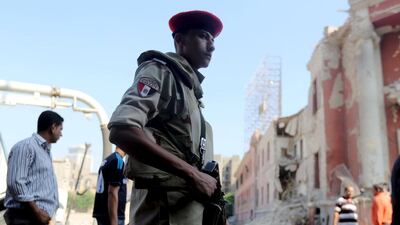CAIRO // A car bombing claimed by ISIL ripped through Italy’s consulate in Cairo yesterday, killing a passer-by and destroying several floors of the historic building.
Nine people were wounded in the blast, including policemen and passers-by. Egyptian health ministry official Hossam Abdel-Ghaffar said the man killed had some of his limbs blown off.
It was the first attack on a foreign mission in Egypt since militants escalated a campaign against security forces two years ago.
ISIL claimed the bombing on Twitter, according to the SITE Intelligence Group.
The US-based security monitor quoted the extremist group’s tweet as saying its militants “were able to detonate a parked booby-trapped vehicle laden with 450kg of explosives at the headquarters of the Italian consulate”.
The bomb went off about 6.30am local time, exploding in a side street in downtown Cairo near the building’s back entrance and a busy motorway overpass.
Italian authorities said the consulate was closed at the time and that none of its workers were wounded.
The attack came less than two weeks after the country’s top prosecutor was assassinated in a Cairo car bombing. That attack has not been claimed.
The early explosion was heard across the capital and tore down the facade of the consulate, a distinctive early 20th-century building, which once housed a school before becoming the Italian consulate after World War II. It forms part of a large complex that also houses a social club and a school, and is located near to both the prosecutor’s office and the supreme court.
The mangled wreck of a vehicle could be seen strewn on the street outside the consulate. Charred car parts littered the street, which had flooded in some areas from ruptured water pipes.
“I was sleeping when the explosion went off. It blew in my window and when I went outside the air was full of dust,” said Ahmed Hasan, 20, a neighbour whose leg suffered minor cuts from flying glass.
A wooden police booth outside the consular building was completely destroyed, while about 50 surrounding buildings were also damaged.
The Italian consul in Cairo arrived at the scene of the attack and went inside the building to inspect it, refusing to speak to reporters.
Rome swiftly condemned the attack, with Italian foreign minister Paolo Gentiloni saying “Italy will not let itself be intimidated”.
“This is not a challenge that the West will win by itself,” he said. “It is a challenge that we will win together with the large majority of the Islamic community and of the Arab governments.”
Mr Gentiloni said there was no doubt that the consulate was the target of the attack, and said that Italy would increase security at Italian sites across Egypt.
Egypt’s foreign minister Sameh Choukri denounced the attack in a telephone call with Mr Gentiloni and pledged that Cairo would “pursue and intensify its efforts ... to fight against terrorism”.
Meanwhile, the European Union’s foreign affairs chief, Federica Mogherini, condemned the attack and expressed solidarity with Egypt.
“Once again Egypt is under attack, once again Europeans have been hit by terrorists,” she said.
“We stand by the Egyptian authorities in their efforts to fight terrorism and bring the perpetrators of this attack to justice.”
Militants have carried out scores of attacks since the army overthrew president Mohammed Morsi in July 2013, killing hundreds of policemen and soldiers, mostly in the Sinai Peninsula.
Diplomats said they had been warned by police months ago that embassies could be targeted, but it was not clear whether this warning was based on specific intelligence.
At least one Western embassy was relocated over security concerns.
On July 1, militants loyal to ISIL launched a wave of attacks in northern Sinai that killed at least 21 soldiers.
Last week’s attacks prompted president Abdel Fattah El Sisi to pledge tougher laws, with the cabinet set to approve a controversial antiterrorism law that sparked uproar among journalists and rights activists.
Mr El Sisi, the former army chief who led Morsi’s ouster, won elections last year, pledging to wipe out the militants and Morsi’s blacklisted Muslim Brotherhood.
The president had overseen a crackdown that killed at least 1,400 people, mostly Morsi supporters, during the dispersal of sometimes violent protests.
Thousands have been jailed, including secular dissidents, and hundreds sentenced to death in mass trials, although most have won retrials.
The draft antiterrorism law would ban independent reporting of militant attacks, stipulating a two-year prison sentence for journalists who contradict death tolls in official statements.
The cabinet has said it would reconsider that provision following a media outcry.
* Agence France-Presse with additional reporting by Associated Press

